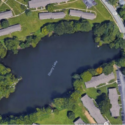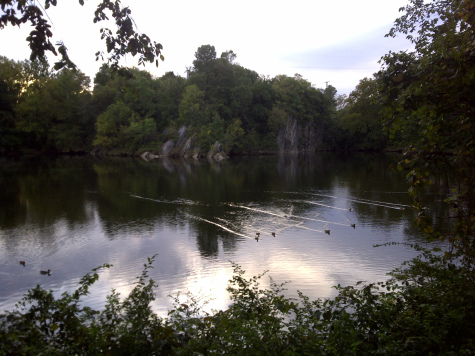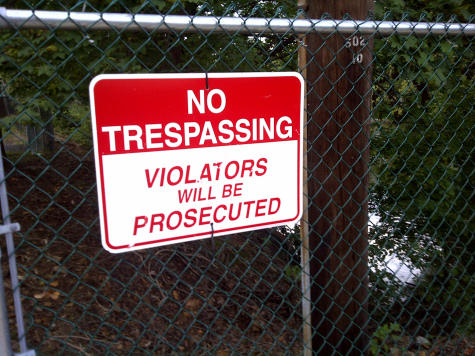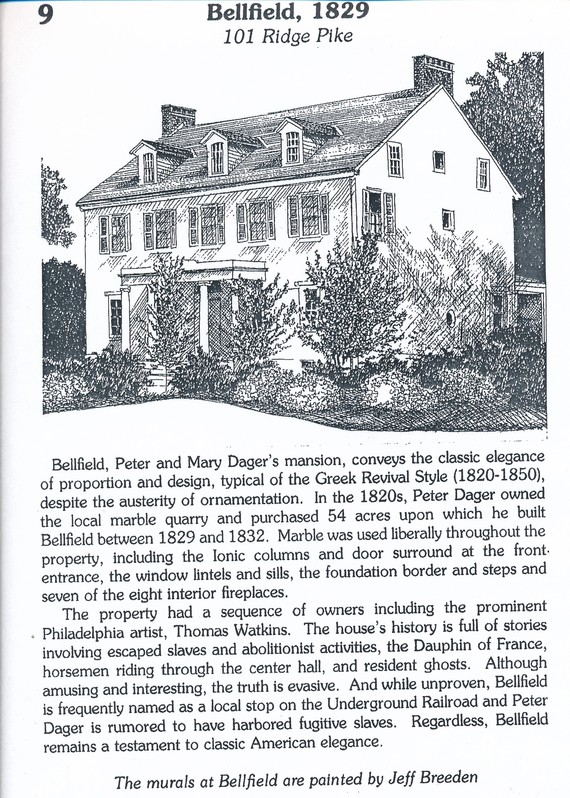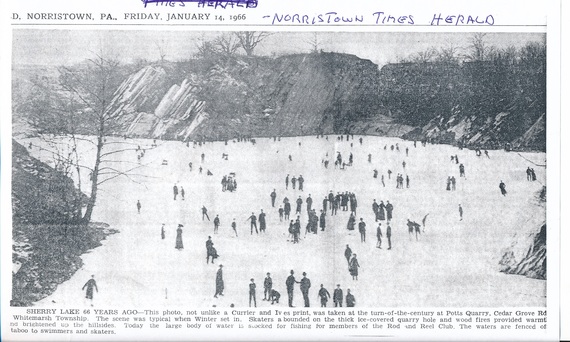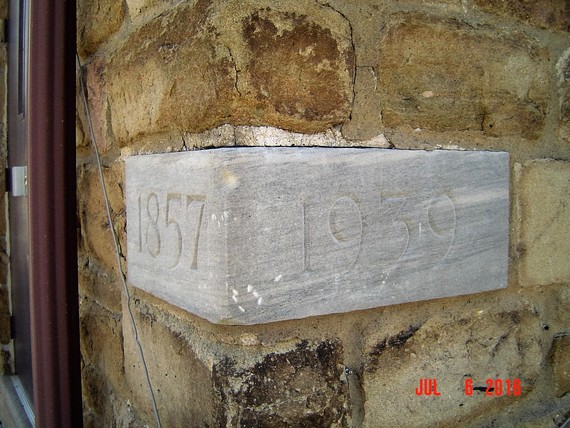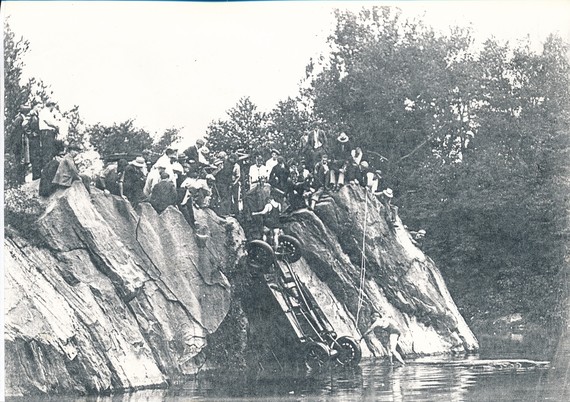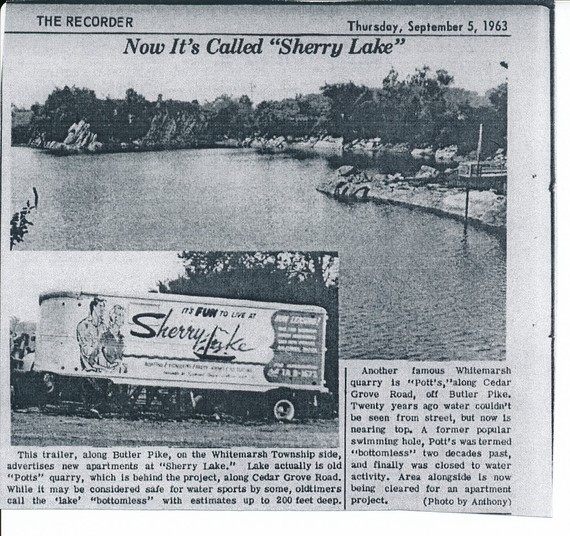MoreThanTheCurve.com is working with the Conshohocken Historical Society to publish an ongoing series of articles about the history of the Conshohocken and the immediate area. Below is the first article:
Stories from the Conshohocken Historical Society – Series 2016, Volume 2
If you have ever visited the Wawa on Butler Pike between Ridge Pike and North Lane you have probably seen the “Sherry Lake Apartments” sign at the intersection of Cedar Grove Road and Butler Pike . When seeing this sign I have often wondered to myself “So where is Sherry Lake? and “Is there really a lake in Conshohocken?”
Rather than keep you the edge of your seats I am going to let you in on the answers to these questions at the beginning of this article. Sherry “Lake” is about ¼ mile from the intersection of Butler Pike and Cedar Grove road on Cedar Grove Road in the middle of several apartment buildings. The “lake” is a retaining basin for storm run-off and is currently fenced off to the general public. Two current pictures copied from the amusing blog “Sherry…Is it Really a Lake” are displayed below.
So as you can see today “Sherry Lake” is really not much to see. But it was not always this way. And you might be asking “How did this lake arrive in Conshohocken? Was it the end result of the last ice age, or perhaps a meteor collision, or maybe even a volcano?”
The answer is no to the all of the above but the true history behind Sherry Lake is probably even more interesting. It is really a story that can be divided into four parts with its origins starting in the early quarry mining days of this area.
Part one – Potts’ Quarry – A working Quarry
Spoiler alert…the name “Potts’ Quarry” is significantly important to this story.
Although information is sketchy as far back as the early 18th century marble quarrying seems to have flourished in this area. Several quarries in what is now Whitemarsh Township are mentioned in a 1714 deed when David Harry sold a quarry which included “150 acres East of Conshohocken Pike (Butler Pike) and South of Ridge Road (Ridge Pike)” to Tom Coldee. This acreage is partially occupied today by the houses along Butler Pike behind the Giant food store as well as the existing Sherry Lake Apartment complex. In 1731 this land (with quarry) was sold to Philadelphia carver Anthony Wilkinson.
Anthony, his son Brian, and Samuel Harding seemed to have operated a very successfully marble carving business with a store front in Philadelphia and a reputation which extended to customers in London. Table tops, ornaments, and other works were created by these three gentlemen from marble mined from their quarry. This quarry was known for its Pennsylvania clouded or blue marble. The marble mined at this quarry was used for the mottled marble trimmings and the nine panels which adorn the Chestnut Street entrance of the Pennsylvania State House now known as Independence Hall.
During the early 19th century quarries in the area, including the Wilkerson quarry, continued to boom. In 1802 Anthony Wilkinson sold his quarry to Philadelphia marble dealer James Traquair. Traquair employed Italian sculptor Guiseppa Jarella to create “headstones, chimney pieces, side and currying tables, and monuments in the ancient or modern style”. In 1826 Traquair sold the quarry Peter Dager and Daniel O Hitner.
Peter Dager built his home, which still stands, on the northeast corner of Ridge Pike and Spring Mill Road as a “demo” with marble from his quarry. During the creation of this article the current owner gave me a tour of this home and indeed the house is filled with marble from Peter’s quarry. The house is officially known as “Bellfield”. A brief history of the house is below.
The quarry was then sold four times between 1834 and 1864 passing thru the hands of Peter and Daniel Dager (father and son), Robert Potts, Nathan Hallowell, and finally to E. Channing Potts. In 1893 the quarry ceased operations and in 1915 the last working quarry owner, E. Channing Potts, died at the age of 82. To many in Conshohocken of a certain age (including myself) this area of Whitemarsh (including of course the “quarry lake”) is still known as “Potts’ Quarry” named after the last working quarry owner.
Part two – Potts’ Quarry – Unofficial Recreation Area
At the turn of the century the quarry was abandoned and with not very many people living in the immediate quarry area the quarry and its surroundings soon become known for its peaceful and bucolic countryside. However this period could be considered Potts’ Quarry most colorful (and to some folks most memorable) period for the following reasons:
- Swimming area – As we all know summer days in the Conshohocken area can become very “sticky” and before the days of air conditioning folks had very few options to cool off. One of these options was swimming and since the abandoned quarry was now a very cool (and deep) lake many folks took the plunge by diving off the quarry “cliffs”. These cliffs can be seen in the below postcard from 1908.
No, this swimming area was not initially sanctioned by any organization and no lifeguards were initially organized but it was a really good way to beat the heat.
- Fishing Hole – Sometime after the quarry was abandoned, local fishermen began to stock the quarry with fish. This provided hours of recreation and some sustenance to local fisherman and their families. However the illegal practice of dynamiting local streams and lakes to kill fish was not unknown to Potts’ Quarry. The Conshohocken Recorder of August 2, 1910 had a front page story concerning the apprehension of “Five Italians” (two with the last name of “Sullivan” which seems to be a very unusual Italian name….but I need to move on) residing in Germantown who were charged with throwing dynamite into Potts’ Quarry to kill fish. All five Italians were convicted of their crime and sent to jail.
- Ice Skating – When the weather turned cold and the lake froze folks got their skates sharpened and went ice skating on Potts’ Quarry. Heat for warmth was provided by skater created shore fires. A picture of such a scene taken in the early 1900s is below.
- Boxing – In August of 1934 local light weight Johnny Craven trained for his boxing match against Marty Little of Philadelphia at Potts’ Quarry. This match was to occur at Memorial Park in Lansdale. No word on how Johnny made out.
- Partying – There are a number of references in the Conshohocken Recorder about the “wonderful nights” at Potts’ Quarry. Apparently this was the place where young people (even “respectable” young people) went to party around a bonfire.
- Outdoor stage for silent films – Before sound and before Hollywood the Philadelphia area was a center for silent film production. At least two film studios (the Liberty Motion Picture Company of Germantown and Lubin Film aka Betzwood Studios) used Potts’ Quarry and the surrounding country side as an outdoor stage for their films. Film content ranged from Westerns, to Lincoln’s assassination, to the Revolutionary War. Details include:
- The Conshohocken Recorder of January 21, 1908 describes a film about the death of Abraham Lincoln and the capture of John Wilkes Booth. Part of the performance consisted of a pursuit to Potts’ Quarry of one of Booth’s companions where the victim was thrown into the quarry pond at $5.00 a throw.
- The Conshohocken Recorder of October 29, 1915 contains an advertisement for an attraction at Little’s Opera House (in Conshohocken) for the photoplay “An American Gentleman” in five parts with William Bonelli. Part of the advertisement states that the photoplay was “made by the Liberty Motion Picture Company of Germantown and taken at Potts’ Quarry in Conshohocken – Scenes that you are all familiar with.”
I did try without success to find a surviving silent film that contained scenes from Potts’ Quarry.
If you are interested in more details I have reprinted below two other articles from the Conshohocken Recorder. The second article I find particularly amusing because of the director’s complaining about crowds making noise and getting in his way. It must have been those rowdy “Conshohockeners” causing trouble again.
Article One – Conshohocken Recorder June 26, 1914
WILD WEST THRILLS AT POTTS’ QUARRIES
Movie Actors and Actresses will be there for Three Weeks
Quiet, peaceful Potts’ quarries and part of the Cressman farm, in Whitemarsh just beyond the borough limits, for the next three weeks will be the stage setting for a great Western moving picture. There will be Indians, Cowboys, Cowgirls, the famous Canadian North West Police, bronchos, log cabins and all the properties for a great, thrilling picture of life in the Canadian North West. Beside the artificial properties, the farm, with its grove of trees, the quarry with its high marble cliffs and great pool of crystal water, makes an ideal setting for the picture man.
The Liberty Motion Picture Company, of Germantown, has leased the property for the purpose of making the big picture which will fill three thousand feet of film and will be shown in three reels. This morning, Director Milligan, who says his company the biggest and best equipped studios and factory in the country, if not in the world, began to take the first part of the picture which will show an Indian on-the trail. There are about fifteen actors and actresses in the troop and in making the picture they will perform many daring feats.
Article Two – The Conshohocken Recorder July 30, 1915
THRILLERS FOR THE MOVIES
Horses Jump From Thirty-foot Cliff. — Crowds witness thrilling scenes
A moving picture concern has leased Potts’ Quarries and the adjoining fields for staging moving pictures. Tuesday was a day of thrillers. The American Continental troops and the British Red Coats fought a battle and live horses, especially trained jumping horses, jumped over the quarry side, a sheer drop of thirty feet, into the deep water. The jump was accomplished without accident.
Tuesday evening two of the horses broke from the stable and jumping a fence escaped into the road. That the horses were missing was not discovered until Wednesday morning and an alarm was sent to all nearby police. The horses were found wandering along the roadside and taken to the Roxborough police station where the owners recovered them.
Miss May Ward, who was one of the principals in the “Wizard of Oz” and other musical comedies, is playing the principal female roles for the movies.
Every day large crowds visit the quarry and witness the taking of pictures. Oftentimes the work of the actors and the director is interfered with by the crowd making remarks and acting boisterously. The director says he is glad to have the people witness the picture scenes but interfering with the work is such a serious matter that the public will be excluded unless there is better behavior.
Unfortunately these colorful times also had a dark side. Between 1907 and 1932 the Conshohocken Recorder contained articles describing 3 injuries, 5 drowning rescues, 1 suicide, and 2 fatal drownings at Potts’ Quarry which included the drowning of local 9 year old boy named Frank Konkoski (Conshohocken Recorder, June 6, 1919). (I remember my mother talking about drownings at Potts’ Quarry when I was growing up.) There were also a number of stolen cars which were “deposited” in the quarry. I will talk more about cars in Potts’ Quarry later in this article.
After each drowning there was a lot of discussion about how to make the area safer for the inevitable summer swimmers. This was somewhat resolved by the intervention of the local Conshohocken Community.
The Conshohocken Recorder of July 29, 1924 reports that William Warner Harper, who acquired Potts’ Quarry property after the quarry ceased commercial operation, agreed to join forces with Boy Scouts Troop Number 1 to turn the quarry into a public swimming facility for the 1925 swim season. The Boy Scouts, under scout master the Reverend T.A. Armour, constructed lavatories, changing rooms, diving boards, an anchored floating platform, and most importantly, provided lifeguards for the safety of the swimmers. In later years the Boy Scouts also constructed a sandy beach which allowed sunbathers to take full advantage of the summer sun. The Boy Scouts provided this service from the beginning of the summer of 1925 thru the summer of 1937.
Potts’ Quarry Rumors
Before moving onto part 3 of this article I thought I would try to resolve some of the rumors surrounding Potts’ quarry. Some of these rumors may never be fully resolved (because to do so would mean draining the existing “lake” which is not going to happen) but I think we can probably resolve most of these rumors with a high degree of certainty.
Rumor One – Marble from Potts’ Quarry was used in the Washington Monument
The short answer is…maybe. During the construction of the Washington Monument states and other organizations provided memorial plaques which were attached along the interior monument staircase. Among these organizations were Hitner’s Quarry and the Association of Journey Men Stone Cutters of Philadelphia both of which used white marble mined at Hitner’s Quarry (this quarry is currently the site of Green Valley Country Club in Whitemarsh Township). There does not seem to be any direct documentation that marble from Potts’ Quarry was used in the Washington Monument. However, after reading all of the histories and examining all of the monument plaques currently in the Washington Monument (via the Internet) a marble plaque that may have been provided by Potts’ Quarry is the International Order of Odd Fellows (I.O.O.F) of Philadelphia plaque. This is because the marble used for the I.O.O.F plaque seems to be the “mottled blue” type which was characteristic of the marble mined at Potts’ Quarry.
Rumor Two – There are mining and/or pumping machines that still remain at the bottom of the quarry
True. As the quarry became deeper, steam pumps were needed to keep the underground streams from flooding the bottom of the quarry. The deeper the quarry proceeded, the more important these pumps became until finally the inrush of spring water overwhelmed the steam driven pumping machines. Bill Collins, Sr. documented this information by interviewing Harry Frees of Whitemarsh Township for the once popular Norristown Times Herald column “Heard Under the Spreading Maple Trees”.
Rumor Three – There is a human skeleton at the bottom of the quarry
False. All drowning incidents seem to have ended with the recovery of a body. This has probably been confused with a true incident which occurred at another quarry in Whitemarsh Township. According to an article printed in the Conshohocken Recorder on January 28, 1936 another local quarry owned by the Hitner family was pumped dry in 1853 only to discover a human skeleton. Local residents were not surprised and indicated that it was the remains of William McClay who fell into the water in 1830.
Rumor Four – Marble from Potts’ Quarry was used in many Conshohocken area homes
Most probably true. I have found two document cases which lead me to this conclusion. The first is the previously mentioned “Bellfield” house built on the corner of Ridge Pike and Spring Mill Road in Whitemarsh Township. The second is the cornerstone of the Methodist Sunday School building which adjoins the Methodist Church at West 6th Avenue and Fayette Streets in Conshohocken. According to the Conshohocken Recorder of August 11, 1939 blue marble mined at Potts’ Quarry was used as a cornerstone for the original Methodist Church build at Elm and Fayette Streets in 1857. Many years later in 1939 this cornerstone was re-used (with much ceremony) as the cornerstone for the Methodist Sunday School building at West 6th Avenue and Forest Streets. Below is a picture of this cornerstone today with both the 1857 and 1939 dates.
Rumor Five – The Water at Potts’ Quarry was “tidal”…i.e. rose and fell much like the ocean tides
True. Now you would not see water level in the quarry rise and fall daily but over a three to five year span the water would rise by as much as 7 feet and then receded. This seemed to occur with such regularity that the local folks were concerned that the water would overflow the quarry and flood nearby Cedar Grove Road. The reason for this “tidal” behavior is that Potts’ Quarry was connected to a series of underground rivers which caused the water level to rise during “wet” times and fall during “dry” times.
Rumor Six – There are cars at the bottom of the quarry
Most probably false. This is not to say cars, especially stolen cars, did not end up in the quarry. The Conshohocken Recorder of August 2, 1929 contains a story of a car being recovered from the quarry that had been stolen in Philadelphia three weeks previously. However the “big” car recovery effort occurred in 1944. The Conshohocken Recorder of February 4, 1944 contains the story of the recovery of four stolen cars from the quarry. These 4 cars were among the 25 cars stolen by a gang of 8 teenagers known as “Crime Association Inc.”. A large crowd of about 1500 people gathered to watch the salvage operation.
The picture below shows a car being recovered from Potts’ Quarry. Although there is no know documentation concerning when this picture was taken, because the vegetation and clothing pictured are very summer-like we think this is picture of the 1929 summer salvage operation. The 1944 salvage operation occurred at the height of winter which required the salvage operators to break the quarry’s surface ice before safely starting their work.
Part three – Potts’ Quarry – Unofficial recreation area becomes Sherry Lake Swim Club official recreation area
At some point William Harper sold the land to Andorra Nurseries Ltd which then shared ownership with the Philadelphia Electric Company. In 1938 Andorra Nurseries leased the land to Mr. and Mrs. Walter Heck who created the Sherry Lake Swimming Club. This club really expanded the work of the Boy Scouts and included tennis courts, a refreshment stand, rafts, diving platforms, a picnic area, volleyball, and a beach. The Hecks lived in a house close to the quarry at 1860 Butler Pike so they were almost always available to the club’s members. Their son Walter also worked as a life guard at the club. Membership reached 500 people.
Besides just general summer fun, according to the Conshohocken Recorder the following events “of note” occurred during the club’s operation.
- The Conshohocken Recorder of August 29, 1939 describes how Eddie Greenhallow (or “Eddie the Oil Man” as he was known because he sold oil to farmers and housewives) encountered a 14 inch alligator (yes I did say alligator) moving toward a gutter which eventually emptied into Sherry Lake. Eddie contacted John Rahm and Jerry Dunakowski who eventually sent the alligator into the next world via a shotgun blast. I am not really sure I believe this story (having not personally encountered any Conshohocken alligators) but it was in the Conshohocken Recorder on page one as a news item (and it was not April fools day) so someone must have seen something.
- The Conshohocken Recorder of August 1, 1950 describes a water show sponsored by the Optimist Club of Norristown occurring on Monday July 31. More than 350 persons attended. Entertainment included swimming demonstrations by Joe Verdeur and Marge Hulton both US breast stroke champions. Everyone was also entertained by a 10 girl water ballet with the swimmers dressed in “fuchsia colored bathing suits and flower trimmed caps”.
But as in life old habits (and names) die hard. Many in Conshohocken still referred to Sherry Lake as Potts’ Quarry. An interesting note which highlight’s this fact is the way Sherry Lake is referred to in many Conshohocken Recorder articles of this period. In many stories references to Sherry Lake are following by Potts’ Quarry in parenthesis. For example: “Last week at Sherry Lake (Potts’ Quarry)……and next week at Sherry Lake (Potts’ Quarry)”. I guess sometimes it is really hard to teach an old dog new tricks.
The club closed after the 1954 swimming season after Andorra Nurseries refused to renew the club’s lease. The main reason cited was that the area was beginning to get built up with homes and folks were afraid of children wondering into the lake and drowning. This was probably part of the reason but land values were increasing and Andorra Nurseries could have been looking toward the future. I.E. Developing the land for apartments.
Part four – Sherry Lake Swim Club becomes Sherry Retaining Basin.
Soon after Sherry Lake Swim Club closed plans were made to develop the land around Sherry Lake into apartments. One of the first official apartment development petitions was aired before the Whitemarsh Board of Supervisors on September 15, 1960. Some of the first apartments were rented in 1963. Today Potts’ Quarry/Sherry Lake is fenced off to the public. It is part of the area’s rain drainage network and can also be seen in some of the apartment complex’s publicity photos and advertisements.
The picture below appeared in the Conshohocken Recorder of September 5, 1963 as part of an article on the area’s quarries. As you can see there was still a lot of emotional attachment to the old Potts’ Quarry.
So for those of you interested in summaries, here is the cliff note version of the answer to the question “So where is Sherry Lake?Sherry Lake is
- The remnants of a marble quarry (known as Potts’ Quarry after its last owner.)
- The remains of an un-official recreation area also known as Potts’ Quarry
- The remains of an official recreation area known as the Sherry Lake Swim Club
- And finally today a retaining basin for storm run- off located on the grounds of the Sherry Lake Apartment Community on Cedar Grove Road
Photos – All but top photo provided by Conshohocken Historical Society. Top image from Google Earth.

